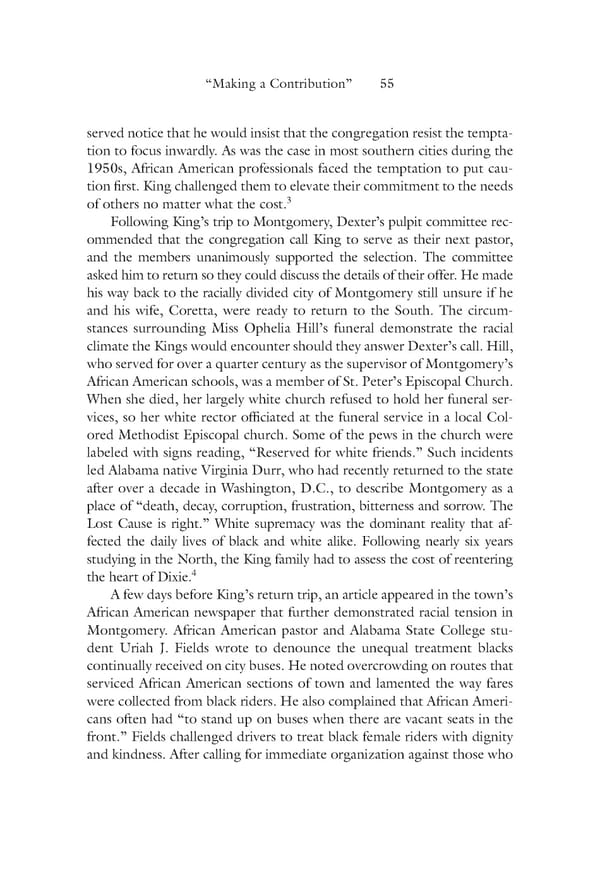“Making a Contribution” 55 served notice that he would insist that the congregation resist the tempta- tion to focus inwardly. As was the case in most southern cities during the 1950s, African American professionals faced the temptation to put cau- tion first. King challenged them to elevate their commitment to the needs 3 of others no matter what the cost. Following King’s trip to Montgomery, Dexter’s pulpit committee rec- ommended that the congregation call King to serve as their next pastor, and the members unanimously supported the selection. The committee asked him to return so they could discuss the details of their offer. He made his way back to the racially divided city of Montgomery still unsure if he and his wife, Coretta, were ready to return to the South. The circum- stances surrounding Miss Ophelia Hill’s funeral demonstrate the racial climate the Kings would encounter should they answer Dexter’s call. Hill, who served for over a quarter century as the supervisor of Montgomery’s African American schools, was a member of St. Peter’s Episcopal Church. When she died, her largely white church refused to hold her funeral ser- vices, so her white rector officiated at the funeral service in a local Col- ored Methodist Episcopal church. Some of the pews in the church were labeled with signs reading, “Reserved for white friends.” Such incidents led Alabama native Virginia Durr, who had recently returned to the state after over a decade in Washington, D.C., to describe Montgomery as a place of “death, decay, corruption, frustration, bitterness and sorrow. The Lost Cause is right.” White supremacy was the dominant reality that af- fected the daily lives of black and white alike. Following nearly six years studying in the North, the King family had to assess the cost of reentering 4 the heart of Dixie. A few days before King’s return trip, an article appeared in the town’s African American newspaper that further demonstrated racial tension in Montgomery. African American pastor and Alabama State College stu- dent Uriah J. Fields wrote to denounce the unequal treatment blacks continually received on city buses. He noted overcrowding on routes that serviced African American sections of town and lamented the way fares were collected from black riders. He also complained that African Ameri- cans often had “to stand up on buses when there are vacant seats in the front.” Fields challenged drivers to treat black female riders with dignity and kindness. After calling for immediate organization against those who
 Becoming King: Martin Luther King Jr. Page 75 Page 77
Becoming King: Martin Luther King Jr. Page 75 Page 77